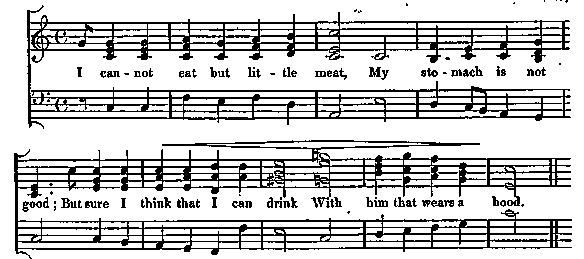Popular Music Of The Olden Time Vol 1
Ancient Songs, Ballads, & Dance Tunes, Sheet Music & Lyrics - online book
| Share page | Visit Us On FB |
|
72 ENGLISH SONG AND BALLAD MUSIC. |
|||
|
I CANNOT EAT BUT LITTLE MEAT.
This song was sung in " a right pithy, pleasant, and merry comedy," called Q-ammer GLurtorfs Needle, which was printed in 1575, but the Rev. Alex. Dyce has given a copy of double length from a manuscript in his possession, and " certainly of an earlier date than the play." It may be seen in his account of Skelton and his writings, vol. i., p. 7. I have selected four from the eight verses, as sufficiently long for singing. Warton calls it " the first drinking song of any merit in our language." In early dramas it was the custom to sing old songs, or to play old tunes, both at the commencement and at the end of the acts. For instance, in Summer's Last Will and Testament, which was performed in 1593, the direction to the actors in the Prologue is to begin the play with " a fit of mirth and an old song:" and at the end of the comedy, Ram Alley, "strike up music; let's have an old song." In Peele's Arraignment of Paris, Venus "singeth an old song, called The wooing of Colman." In Marston's Antonio and Mellida, Feliche sings " the old ballad, And was not good hing Solomon." To these instances many others might be added; indeed, in the very play (Gammer Ghurton), at the end of the second act, Diccon says :—
" In the mean time, fellows, pipe up your fiddles, I say take them And let your friends have such mirth as ye can make them."
The tune is printed in Stafford Smith's Musica Antiqua, and in Ritson's English Songs. Ritson says: " Set, four parts in one, by Mr. Walker, before the year 1600." And Smith, not knowing, I suppose, who Mr. Walker was, seems to have guessed Weelkes; but it is the old tune of John Dory in common time. In moderate time, and well marked. |
|||
|
|
|||
 |
|||
|
|
|||
|
Though I go bare, take ye no care,
' For I am never' cold : I stuff my skin so full within
Of jolly good ale and old. Back and side, go bare, go bare,
Both foot and hand go cold :' But belly, God send thee good ale enough,
Whether it be new or old. |
I love no roast, but a nut-brown toast,
And a crab laid in the fire, A little bread shall do me stead,
Much bread I never desire. No frost nor snow, nor wind, I trow,
Can hurt me, if it would ; I am so wrapp'd, so thoroughly lapp'd
With jolly good ale and old.
Back and side, &c. |
||